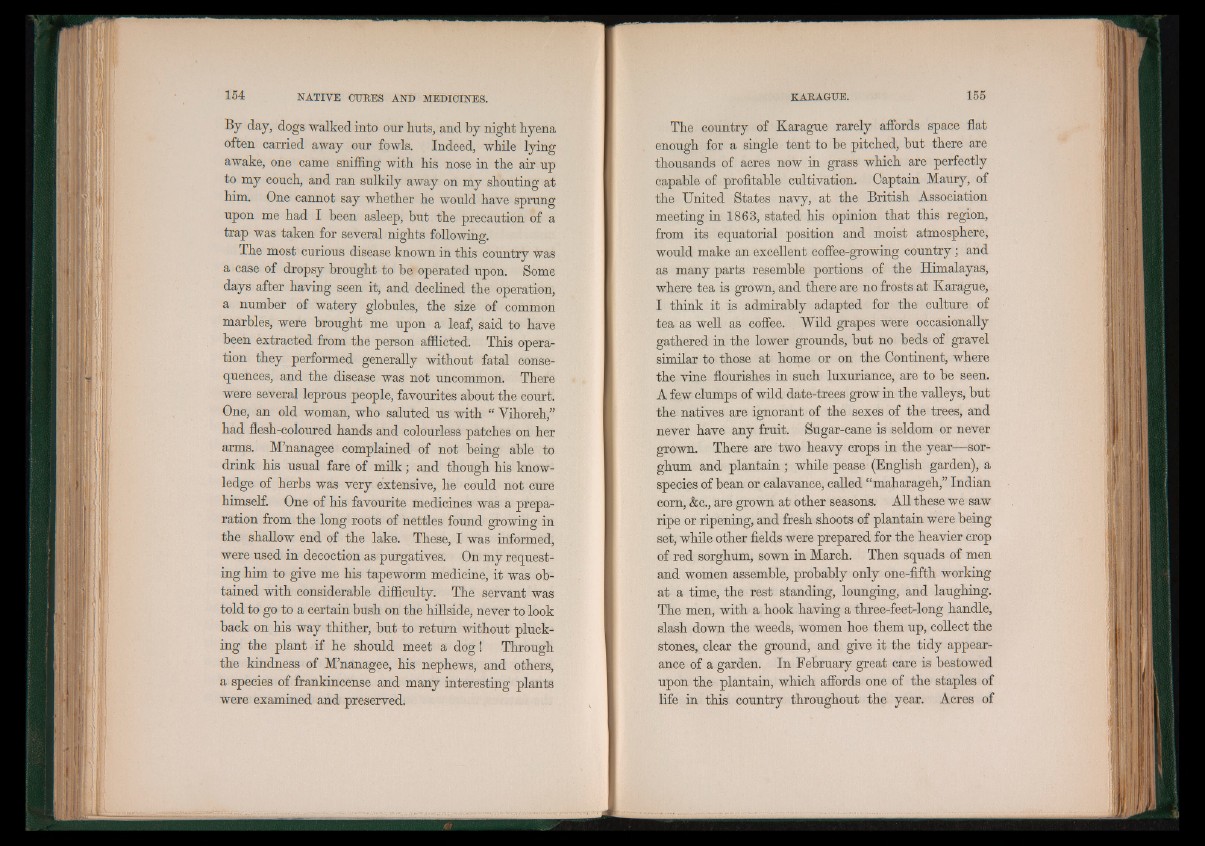
By day, dogs walked into onr huts, and by night hyena
often carried away our fowls. Indeed, while lying
awake, one came sniffing with his nose in the air up
to my couch, and ran sulkily away on my shouting at
him. One cannot say whether he would have sprung
upon me had I been asleep, hut the precaution of a
trap was taken for several nights following.
The most curious disease known in this country was
a case of dropsy brought to be operated upon. Some
days after having seen it, and declined the operation,
a number of watery globules, the size of common
marbles, were brought me upon a leaf, said to have
been extracted from the person afflicted. This operation
they performed generally without fatal consequences,
and the disease was not uncommon. There
were several leprous people, favourites about the court.
One, an old woman, who saluted us with “ Vihoreh,”
had flesh-coloured hands and colourless patches on her
arms. M’nanagee complained of not being able to
drink his usual fare of milk; and though his knowledge
of herbs was very extensive, he could not cure
himself. One of his favourite medicines was a preparation
from the long roots of nettles found growing in
the shallow end of the lake. These, I was informed,
were used in decoction as purgatives. On my requesting
him to give me his tapeworm medicine, it was obtained
with considerable difficulty. The servant was
told to go to a certain bush on the hillside, never to look
back on his way thither, but to return without plucking
the plant if he should meet a dog! Through
the kindness of M’nanagee, his nephews, and others,
a species of frankincense and many interesting plants
were examined and preserved.
The country of Karague rarely affords space flat
enough for a single tent to be pitched, but there are
thousands of acres now in grass which are perfectly
capable of profitable cultivation. Captain Maury, of
the United States navy, at the British Association
meeting in 1863, stated his opinion that this region,
from its equatorial position and moist atmosphere,
would make an excellent coffee-growing country; and
as many parts resemble portions of the Himalayas,
where tea is grown, and there are no frosts at Karague,
I think it is admirably adapted for the culture of
tea as well as coffee. Wild grapes were occasionally
gathered in the lower grounds, but no beds of gravel
similar to those at home or on the Continent, where
the vine flourishes in such luxuriance, are to be seen.
A few clumps of wild date-trees grow in the valleys, but
the natives are ignorant of the sexes of the trees, and
never have any fruit. Sugar-cane is seldom or never
grown. There are two heavy crops in the year—sorghum
and plantain ; while pease (English garden), a
species of bean or calavance, called “maharageh,” Indian
com, &c., are grown at other seasons. All these we saw
ripe or ripening, and fresh shoots of plantain were being
set, while other fields were prepared for the heavier crop
of red sorghum, sown in March. Then squads of men
and women assemble, probably only one-fifth working
at a time, the rest standing, lounging, and laughing.
The men, with a hook having a three-feet-long handle,
slash down the weeds, women hoe them up, collect the
stones, clear the ground, and give it the tidy appearance
of a garden. In February great care is bestowed
upon the plantain, which affords one of the staples of
life in this country throughout the year. Acres of